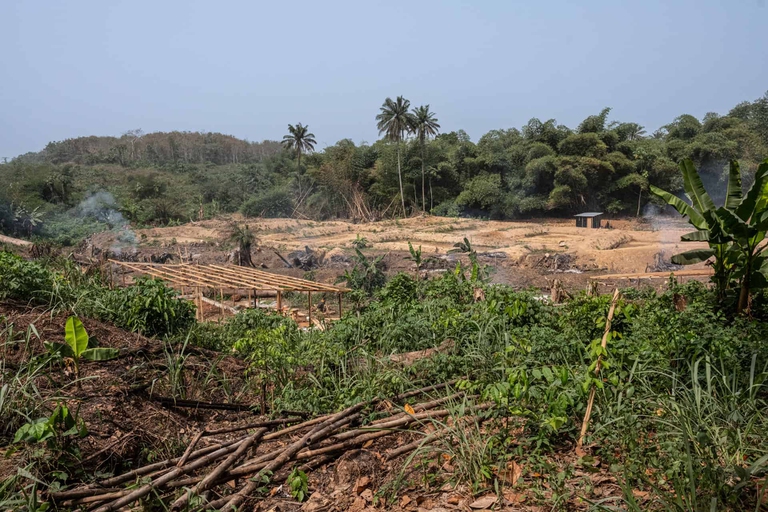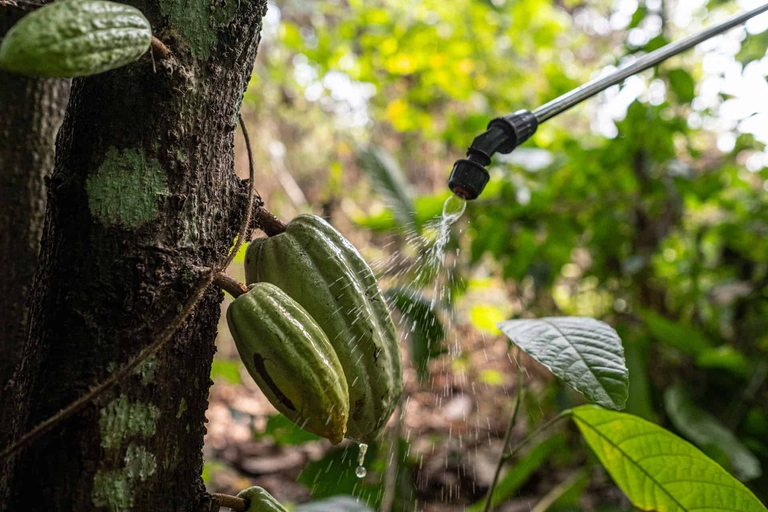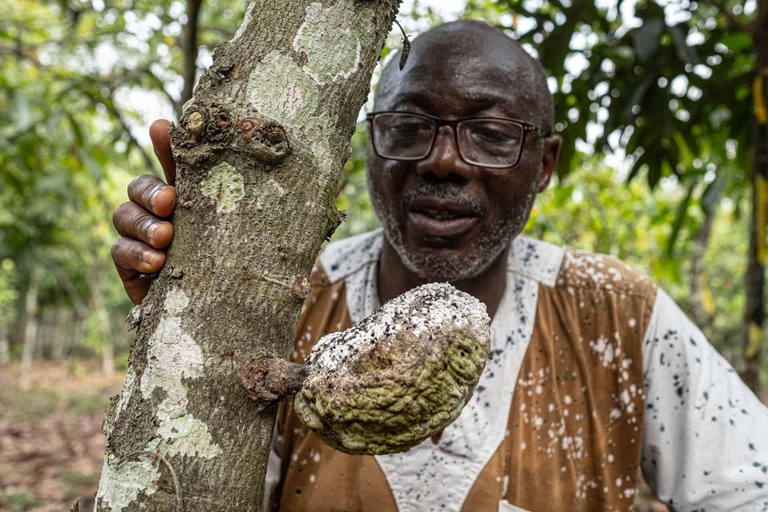https://www.lifegate.it/cacao-costa-davorio
- |
It is early morning on the edge of a village north of Agboville, in the Agnéby-Tiassa region of southern Ivory Coast. Aces Hervé, enters the greenery of the forest with a backpack and a machete on his shoulders to make his way through the foliage.The 46-year-old is on his way to work on his cocoa farm.

He moves slowly and methodically from one tree to another, scrupulously observing all the green and yellowish pods ripening on the trunks full of precious beans.“The cocoa tier is a very delicate plant.It must be checked every day.The pods become ripe approximately every three months and then we can harvest them, put the beans to ferment for seven days and then dry them in the sun", explains Assi, who started growing cocoa as a child together with his father.“As far as I can remember, I can't think of a period as dark as the one we are experiencing,” says the farmer, referring to particularly negative collections in recent years. “Plants need a perfect balance of rain and heat to perform well, but everything went out of whack.Furthermore, many became ill and then there was nothing left to do."
Climate change adds to the problems of the "cocoa system"
Ivory Coast and Ghana, where over 70 percent of the cocoa beans marketed in the world are produced, have been hit by El Niño in the last year, the effects of which have become even more destructive due to the global climate crisis.Sudden rains, too intense and at the wrong times were followed by temperatures that were too high.To aggravate the situation, the swollen shoot virus and the black pod fungus have spread and have further affected the cabosses.

The consequence materialized in a series of catastrophic harvests they have the "cocoa system" was put into crisis And sent the price of beans on international markets skyrocketing Where brokers did not hesitate to speculate.It is expected that by the end of the 2023/24 harvest, more than a quarter of the production will be missing.Of the six hectares of land that his father left him, Assi currently puts half of it under cultivation.“I love cocoa, but I had to make this choice because the price paid no longer corresponds to the effort required for this cultivation”.Cocoa is a monoculture that has not been industrialized despite being completely destined for the international market. Farmers with small plots produce, entirely by hand, more than half of the world's harvest.“It takes a lot of laborers and there are a lot of expenses, but these plants no longer produce as much as they used to.Once upon a time we thought in terms of tons, today the yield has halved and we think in terms of hundreds of kilos", says Assi.
With more than 30 years of experience, the farmer is trying to let the other half of his plot fall asleep in the hope that it will become fertile again.However, producing at half the potential of the past and with several dependent children, he is unable to make ends meet and with his family he has had to start other activities such as chicken farming and small businesses.Despite traders and cocoa multinationals managing a global market worth billions of dollars, with enormous profits, most West African farmers continue to receive only a small slice and lives below the poverty line due to a deeply unequal system that is showing signs of unsustainability.

In Côte d'Ivoire, growing cocoa is no longer convenient and people switch to other crops
Like many other Ivorian farmers, Assi is in fact thinking of making more radical decisions like that of replace cocoa with other crops.“Many acquaintances have started oil palm or caoutchouc.For some, bananas are more productive and in the area there are those who have set up a partnership to do fish farming" he admits interestedly.The recent doubling of the minimum price guaranteed to producers decided by the Ivorian government through the CCC (Conseil Café Cacao) agency under pressure from the cooperatives does not appear to be sufficient.A one kilo bag will be paid 1,500 cfa (€2.30), but the cost of living has increased in Ivory Coast after Covid 19 and we have entered a vicious circle whereby the yield is now too low to recover the loss.Years of low prices paid to producers have caused the over-exploitation of land, also encouraged by the ever-increasing demand for cheap chocolate (used for mass industrial products and not for tasting).The care and renewal of the plantations have thus been abandoned and should be replaced after a certain period of time.
More and more pesticides and fertilizers on cocoa.Also prohibited
While he speaks, Assi is joined by other young laborers with whom he begins to prepare a vaporizer to spread gods chemicals on the cabosses.They take out some vials of a fungicide with an illegible label and mix a few spoonfuls with a certain quantity of water in the tank.Then a boy starts spraying the product “If you are careful you don't need to take cover, because it is not as strong as many others.In that case you need to leave the cultivation to rest for a few days to be safe", explains Assi. Cases of intoxication are not rare among farmers and their families in Ivorian villages.

The farmer says he has always used phytosanitary products such as pesticides and fertilizers but today, to keep the yield of the cocoa workers sufficient for a profitable profit, the use of plant protection products has increased dramatically.In addition to the intensive use of fertilizers which is eroding the soil, several studies have demonstrated an alarming spread of chemical pesticides, fungicides and herbicides in cocoa cultivation in West Africa.In Côte d'Ivoire and Ghana, 77 percent of families have always used them, but their use is increased 12 times in the last 20 years.

Assi states that he happened to have skin irritations and respiratory problems.“We know it's harmful and we try to protect ourselves as much as possible.When you spend hours doing this, you sometimes come home with a cough and a headache."The danger is increased by the fact that many farmers they are not aware of the correct use of very toxic chemicals and do not use suitable equipment.Furthermore many of these products on the market, of Chinese, Indian or Nigerian origin, I am trafficked illegally and sold at a lower price because they are expired or not approved by the authorities.For many researchers and doctors it represents a public and environmental health problem.
As reported by Public Eye, among these pesticides, moreover, there are substances banned in Europe due to their toxicity but which, paradoxically, are produced and exported by the same European countries that have banned them, to countries producing food for the global food industry.Among these appears the Ivory Coast.Questionable acts and with a boomerang effect at odds with the strategy Farm to Fork of the EU.

In the country, growers' cooperatives have always played an important role in the organization of the supply chain and in trade union influence:from collection to transport to the port of San Pedro or Abidjan where the exporting companies purchase.Their presence allowed authorities and NGOs to intervene with aid and collective awareness initiatives.
“We are registered by the authorities.The CCC provides us with seeds and also chemical products, distributing information on their use, but people often don't know how to read." Agnara Aboud he is the president of “Cavra Coop.Ca”, which brings together more than 100 farmers from the Agboville area and has been working in cocoa for over 40 years.He claims to be against the use of chemical products because they caused him health problems and took away a cousin, who died of poisoning about ten years ago, but had no alternatives.“For five years, alternative organic products have started to circulate in shops but they cost much more than chemical ones,” he says, pointing out the price difference between an organic product and its chemical equivalent in a shop in the city.The first costs 20 thousand CFA (€30.50), while the second costs 5 thousand CFA (€7.50).“We have problems eating, how can we think about the substance we put on the tree?”.

Today, explains Agnara, the cooperatives are increasingly at odds with the authorities accused of withholding a large portion of the earnings and distributing prizes only to those who have their cocoa traced with the "Carte du producteur" (introduced in 2023) and demonstrate that they cultivate organic.For the farmer the State does too little:“They abandoned us.How is it possible that in the face of this crisis, no subsidies are provided to help us survive?Here's what we'll do now:since the government ignores us and that you Europeans also don't buy at a good price, we will cut.
You don't create jobs here and we don't eat chocolate because we certainly can't afford to buy bars and sweets like you.So we'll cut everything."
The testimony of those who do organic farming.And he wins
About 40 km south, on the outskirts of Azaguié, Ambroise N'Koh, 69 years old, is giving instructions to some of his workers who are busy weighing cocoa beans that have completed fermentation.Ambroise is a grower who became famous because in 2019 he received the “International Cocoa Awards” as the best grower in the world at the Paris Chocolate Show thanks to his completely organic production.He studied finance and in the first part of his life he worked in the navy and aviation in the Ivorian economic capital Abidjan.He began focusing on cocoa when his father bequeathed him plantations.“After a few years I started to suffer from serious health problems caused by the chemicals I used in large quantities.I discovered that I have respiratory and skin allergies due to many of those substances.So I started studying alternative methods,” says Ambroise.

The grower explains that he has spent years studying and recover native and natural techniques to combat diseases affecting cocoa and parasites.“You can produce fertilizers with biocompost and insecticides with plants.I put some recipes on the internet accessible to all.I have the habit of calling it my grandmother's agriculture."A technique to combat parasites involves the use of anthills which are "applied" for a certain period to the plants and whose ants feed on the parasites that attack the cabosses.
“Only by continuing to test can we improve.”Ambroise it periodically hosts Ivorian and foreign students and researchers to carry out tests on his plantation and is involved with authorities and NGOs in promoting and raising awareness of organic products among cooperatives.

Although his commitment demonstrates that alternatives exist, he remains aware that efforts to transform the supply chain are currently insufficient:“With the ongoing crisis, growers have fallen out of love with a cultivation that is very hard and delicate as well as unproductive, so it is difficult to push them to change,” he says pessimistically.And he concludes:“It takes large investments to make the changes you ask us to improve, from organic to non-deforestation certification.But if you don't show yourselves reasonable and always intend to pay the same price, the farmer will remain in poverty."
The cocoa sector has always represented great potential for producing countries, as confirmed by the experience of Ambroise N'Koh.However, it remains unexpressed due to the now crystallized "cocoa system" which now seems to degenerate into a self-destructive cycle of production if sustainability reforms are not applied. Big industrial companies don't want to cut profits, often with the complicity of the economic-political elite of local governments, and consumers do not want to pay more for a healthier and more socially fair product.
For many analysts this crisis is necessary and could finally force some greats changes.If there is an increase in the prices of bars in supermarkets, the demand that the environment and farmers can no longer tolerate will certainly decrease somewhat.
